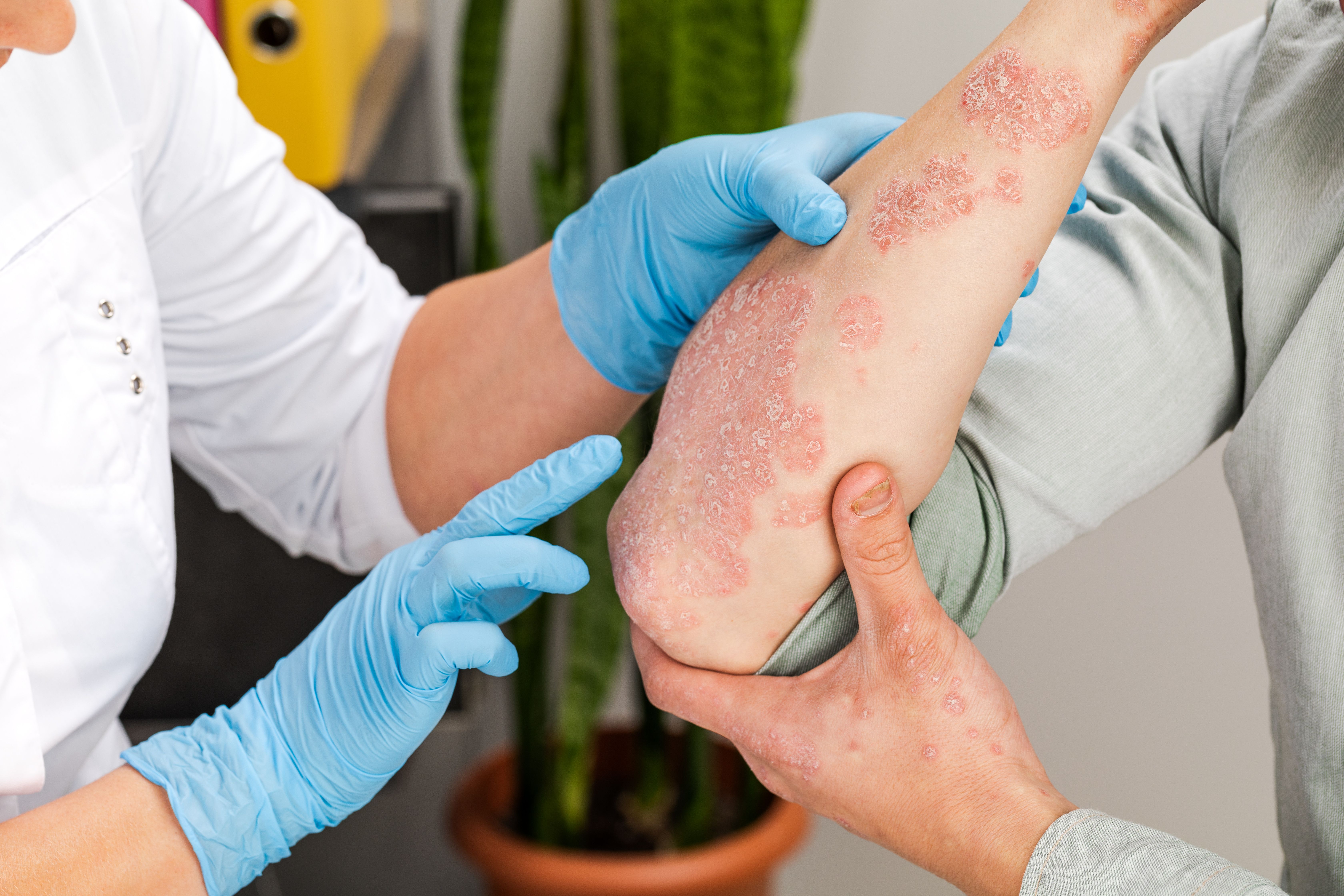- Center on Health Equity & Access
- Clinical
- Health Care Cost
- Health Care Delivery
- Insurance
- Policy
- Technology
- Value-Based Care
Low Stress Resilience Associated With Psoriasis Among Men, Study Shows
Psychological well-being should be considered in the management of psoriasis, research indicates.
Men with low stress resilience may be at an increased risk of psoriasis and psoriatic arthritis, suggesting the importance of incorporating mental health and well-being care in the management of psoriasis.
A dermatologist wearing gloves examines the skin of a sick patient. Examination and diagnosis of skin diseases-allergies, psoriasis, eczema, dermatitis | Image credit: fusssergei - stock.adobe.com

This prospective register study is published in Journal of the European Academy of Dermatology & Venerology.1
“We have shown that lower stress resilience in adolescence is a potential risk factor for psoriasis, at least for men,” says the study’s lead author Marta Laskowski, a doctoral student in dermatology at the University of Gothenburg and a resident physician at Sahlgrenska University Hospital, in a statement.2 “Our results suggest that those with psoriasis have a hereditary psychological sensitivity. It is therefore important that health care professionals also pay attention to the mental well-being of patients with psoriasis.”
To the researchers’ knowledge, this is the first study to explore the association between stress resilience levels in early age and incident psoriasis and psoriatic arthritis.
In this study, the researchers hypothesized that low stress resilience in early life is likely to lead to higher levels of stress during adulthood, resulting in immunological dysregulation from chronically increased stress levels that may lead to an increased risk of psoriasis.
The study included a cohort of Swedish men who were enrolled in compulsory military service between 1968 and 2005, obtained from the Swedish Military Conscription Register (SMCR). All men were followed from conscription until new-onset psoriasis or psoriatic arthritis, death or emigration, or December 31, 2019.
Data in the SMCR were linked to mandatory diagnoses reports from all outpatient and inpatient health care episodes in Sweden using the Swedish National Patient Register (NPR), which allowed the researchers to identify all reported cases of new-onset psoriasis and psoriatic arthritis.
Stress resilience was defined as the ability to successfully cope with and adapt to stressful events, trauma, and chronic adversity while maintaining normal physical and psychological functioning. Additionally, stress resilience was measured using standardized semistructured interviews, and was divided into categories of low, medium, and high resilience.
Furthermore, comorbidities were identified in the SMCR and the NPR for the following: alcohol abuse, ischemic heart disease, and depression/anxiety.
Of the total patient population (N = 1,949,891), approximately 2% to 3% annually were excluded due to imprisonment or because of severe chronic somatic or mental conditions or disabilities, resulting in 1,669,422 individuals recruited for the study.
Men in the lowest stress resilience category had an increased risk of psoriasis (HR, 1.31; 95% CI, 1.26-1.36) and psoriatic arthritis (HR, 1.23; 95% CI, 1.15-1.32) compared with men in the highest resilience category. Additionally, hospitalized patients in the lowest stress resilience group had an increased risk of psoriasis (HR, 1.79; 95% CI, 1.63-1.98) and psoriatic arthritis (HR, 1.53; 95% CI, 1.32-1.77).
However, the researchers acknowledged that because stress resilience was evaluated on only 1 occasion and that changes can occur over time, the study was limited due to potential misclassification from false stress resilience scores.
Despite this limitation, the researchers believe the study suggests that low stress resilience in early age may be associated with a higher risk of developing psoriasis later in life.
“Considering the known association between stress resilience and psychiatric disease, this highlights the importance of addressing psychological well-being in the management of psoriasis,” wrote the researchers.
References
1. Laskowski M, Schiöler L, Åberg M, et al. Influence of stress resilience in adolescence on long‐term risk of psoriasis and psoriatic arthritis among men: A prospective register‐based cohort study in Sweden. J Eur Acad Dermatol Venereol. Published online May 20, 2024. doi:10.1111/jdv.20069
2. Stress resilience is linked to increased risk of psoriasis. News release. EurekAlert! May 21, 2024. Accessed May 21, 2024. https://www.eurekalert.org/news-releases/1045422
